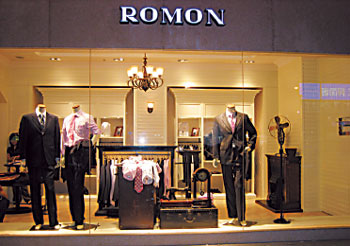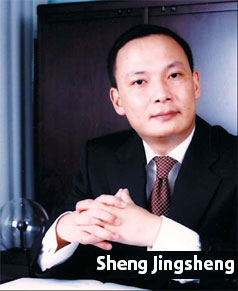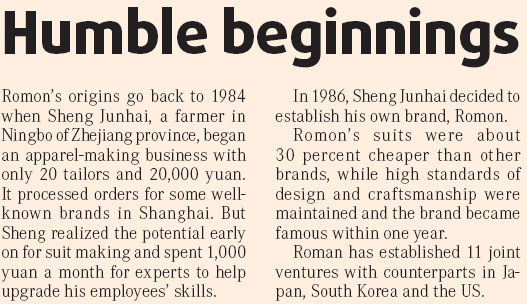

Not many 26-year-olds have the opportunity to manage 1,000 employees or to invest tens of million yuan. But Sheng Jingsheng had the luck.

Sheng, president of the suit-making empire Romon Group Co Ltd, believes it was, however, less luck and more courage and responsibility.
"As the second generation of the founder of my enterprise, I compete with my heart, intelligence and capability. It is not a shining job at all," Sheng says.
Looking older than his age, Sheng appears to be an introvert. He is not talkative, and he is very cautious answering every question asked by the media. For a long time, he lived under the shadow of his father, Sheng Junhai who founded Romon in 1984, producing formal suits.
"It takes time and effort to overtake my father's achievements," Sheng says. "And during this period of time, I have been under a lot of pressure from all areas."
Sheng is actually a bit too modest.
Let's compare Romon now and then. In 10 years' time, Romon's output has grown from 200,000 to over 2 million suits; employees have increased tenfold to 10,000; and Romon's revenues have skyrocketed to 2 billion yuan, 40 times higher than it was under his father's management.
In the meantime, Romon has won many awards including honors from China Top Brand, Well-known Mark and National Inspection-free Products.
Sheng is of course delighted and proud of Romon's success. But he always immediately pulls himself together. "The competition is getting fierce. I still have to get up early in the morning to go to work," he says.
Sheng says he feels three mountains on his shoulder: being responsible for his father, and the career the father has established; being responsible for the company, and the staff; and the "face" which he does not want to lose in front of people.

"At the moment, Romon's daily output stands at 7,000 suits. It will be a disaster if we don't have additional orders for half a month," Sheng says. Similar problems like that often worry Sheng, who often stays awake in the pre-dawn hours wondering what Romon's next step should be.
Sheng was not a novice when he took over the company. He began working at Romon at the age of 18, while he was still in school. At the age of 20, he was a director of marketing and later rotated in almost all the departments to get first-hand experience.
At 26, the second generation was offered the top job and began carrying out a series of reforms. He invested 80 million yuan to improve the manufacturing equipment and spent another 3 million on three sets of computer controlled measuring machines to begin tailor-made service in major cities such as Beijing and Shanghai. His ambition is for Romon to develop 100,000 regular customers within three years.
Sheng shut down six subsidiaries whose sales revenue could not reach 2 million yuan to improve the sales network.
Within the first year, he opened 100 boutiques, 100 department store counters and 100 distributors, on top of the former 200 outlets. He set up a competitive mechanism that guaranteed that each year 10 percent of the outlets with the poorest performance would be closed. For that effort, he spent 50 million yuan.
At the moment, the company has around 1,500 points of sales and 600 local distributors across the country. Romon also has six offices overseas in countries such as the United States, Japan, Italy and France. The Romon brand is registered in over 20 countries and regions.
With the increasing competition in the service sector, more banks and other financial institutions have realized the importance of their staff dressing well and the result has been an increase in Romon's sales of professional uniforms.
Uniform sales, which take 30 percent of Romon's business, have grown by 50 percent in the past two years. Sheng also spent 3 million yuan on hiring Liu Yang, one of China's top 10 designers, to develop female professional uniforms for Romon.
On top of the core business of formal suits and shirts, Sheng has cashed in on the global casual wear trend with lines of T-shirts, jeans and informal trousers.
"We have a quick reaction to market demand," he says. Suits account for 40-50 percent of Romon's total revenue, compared with over 80 percent before Sheng took over the company.
Five years ago, Sheng branched into women's wear by forming a joint venture with a South Korean company, launching a brand called XLMS. The brand is now sold in over 10 provinces, autonomous regions and municipalities in China.
Sheng's ambition now is to make Romon China's top male fashion brand within five years and he is spending 50 million yuan on ads in Central China Television (CCTV) to help make that happen.

(China Daily 04/07/2008 page12)













